We don't know a lot about Judaeo-Greek at all; Julia Krivoruchko (who contributed the online description of Judaeo-Greek) has been working in the area, but there's not much to work with. To her bibliography, add another publication from Our Guy:
- Hesseling, D.C. 1901. Le livre de Jonas. Byzantinische Zeitschrift 10: 208–217.
1263 from memory, from Crete. That is damn old. Will have to post some of that too; Jonah's short.
Also, check out the entry on Judaeo-Greek and Judaeo-Italian by Lazarus Belléli in the 1901 Jewish Encyclopaedia, with a couple of Judaeo-Greek songs.
We don't know much about Judaeo-Greek (or as it's become popular to call it, Yevanic, after the Hebrew for Greece). Noone really cared to record much in the language of the Greek-speaking Jews (the Romaniotes) until the language had died out, after the Holocaust and the Aliyah.
Fun facts from Wikipedia that aren't massively relevant, but it's my blog: Gabrielle Carteris' father was Romaniote. On Beverly Hills 90210, she was Ashkenazed to Andrea Zuckermann. Rae Dalven, who had translated Cavafy (and wrote much about the Romaniotes of Ioannina), may be a Romaniote better known to Greeks; then again, these days, perhaps not. And Hank Azaria's were Sepharad Jews from Salonica—the Sephardim were the majority of Jews in present-day Greek territory. Lazarus Belléli was from Corfu, which presumably makes him an Italian-speaking Jew—the third Jewish community of Greece.
It appears there was a distinct Judaeo-Greek accent, and the obligatory loanwords from Hebrew, but otherwise Jewish Greek wasn't that different from Christian Greek (as Belléli confirms): this wasn't like Yiddish, which changed so much en route from Alsace to Lithuania. The Judaeo-Greek Torah published in Constantinople has the shibboleths of Constantinopolitan Greek—in particular, the subjunctive διώ instead of δω for "see". Belléli thought it's Epirot, which would be consistent with Ioannina being a major Romaniote centre, but Hesseling and Chatzidakis said nay. Hesseling thinks it's a dialectal koine, and works out it's Constantinopolitan—but didn't know that διώ is a Constantinopolitanism: it was early days in Modern Greek dialectology. The text has both accusative and genitive indirect objects, with a few more genitives; so it doesn't come down either side of that isogloss.
This wouldn't be a Hellenisteukontos post if it didn't have gossipy digressions, so here's another two. First, the Ottomans did not allow initially books to be published in Greek script in the Empire—all the early modern printed books in Greek script come from Venice. The ban did not apply to Greek in Hebrew script—it was about the millet (confessional community), not the language; so this was the first book printed in Greek in the Levant. Some more stuff from Hesseling's introduction:
- The Hebrew frontispiece says it was a translation "into the Greek language and the Foreign language, the two languages used by the people of our nation in captivity". It had only been 55 years since the Sephardim arrived in the Ottoman Empire: their language was still Foreign.
- Belléli thinks the Torah's two centuries older (because it doesn't know about "Western European exegetes", and has no Turkish words). But given that he says the translator's command of Hebrew is pretty poor, would they have been up to date on Western European commentaries anyway? Not convinced about what the relative lack of Turkish words proves, either. Hesseling found a few Turkish words, though you might have expected more.
- Hesseling proclaims himself unable to say anything relevant about the Jewish history and religious aspects of the translation, deferring to Belléli's papers mentioned in the Judaeo-Greek bibliography. What he said.
- Er, eek. Just found out from linked bio that Belléli thought Hesseling's transcription of the Torah sucked ("severely criticizing"). Uhoh. Revue des Études Juives "xxxv. 132, 314" is only available on microform at MelbUni; I'm scanning the bastard and putting it online, because people aren't exactly rushing to do a new edition of the Greek Torah, so it's the only correction I'll find. Thank you, Kopelman Foundation, for making the 1901 Jewish Encyclopaedia available online, because noone in Modern Greek philology seems to have noticed this. Apparently Hesseling included a facsimile in his edition, but in my photocopy—Hebraea sunt, non leguntur :-( —the facsimile has been left out.
- Even more infuriating, this discovery from said Jewish Encyclopaedia: there was also a 1576 Judaeo-Greek Job. Sadly, at least according to Belléli, it's vanished.
- Ooh, Belléli was intending to do his own edition of the Torah in 1894, and had already gone to Paris to read the copy there, but got beat to the post by Hesseling. I got the impression they didn't like each other, that explains some things.
- The few printed copies available to Hesseling differed, and Hesseling thinks they were being corrected as they were being printed (Wroclaw and London vs. Paris and Oxford copies). This happened with Shakespeare as well—a few decades later.
- Post-World War II, there'd be fewer copies around of the original edition still; not optimistic about the Wroclaw copy. At least there were three copies in the British Museum and the Bodleian.
- Someone else has published the Ladino translation in the '80s.
- Sounds like this was as much a typographical extravaganza as the Complutensian Polyglot: it also included the Targum Onkelos and Rashi's commentary. 390 pp.
- The construct genitive is rendered in Greek by nominative + nominative.
- The infinitive absolute construction (infinitive plus finite of the same verb, for emphasis) is emulated in Greek with a nominalisation; often a made-up nominalisation. So Exodus 21:5 ειμμό να πη "to say a saying = to say indeed", where ειμμό is made up from είπα. (I thought ειπωμός does exist as a nominalisation, but it's not online or in my dictionaries.). Similarly Exodus 22:15 προικιμό να προικώση "to dower a dowering = to dower indeed". (The Septuagint and Vulgate have echoes of the Hebrew construction as well.)
- The semantics of the words used is carbon copied from Hebrew, not just the syntax.
Second digression: obligatory anecdote lambasting lame Antisemitism. George Valetas, bless his over-excitable red socks (the bio link being to Rizospastis), was a literary scholar who edited many a Modern Greek text, including an anthology of Early Modern Greek prose:
- Βαλέτας, Γ. (επιμ.) 1947. Ανθολογία της Δημοτικής Πεζογραφίας. Τόμος Πρώτος: Από το Μαχαιρά ως το Σολωμό (1340–1827). Αθήνα: Πέτρος Ράνος.
Like everyone in Greece at the time, Valetas was éngagé in the Great Diglossia Wars, proudly and leftistly on the Demotic side. And because he was a literature scholar and polemicist, and not a linguist, his anthology is conscripted to his polemic: to prove that Demotic Is Beautiful, and Has A History. And if his texts didn't sound Demotic enough, he'd make sure they did: he made a point of dropping the final /n/s in the texts he anthologised.
The vernacular dropped its final n's en masse; this is one aspect where Puristic did not really succeed in bringing about a reconquista of archaic features in the standard language—although there is still some debate about whether any n's can appear after masculines at all. Of course, anyone literate in Greek before 1970 was literate in a form of the language that kept its final n's; so final n's would gravitate to Greek in print, however colloquial the author was trying to be.
In volume II of the anthology, Valetas acknowledged the criticisms of those who said he really had no right to play God with the texts as they had originally been published. He acknowledged them by saying THEY WERE REVANCHIST TROGLODYTES WHO SHOULD KEEP THEIR CLAMMY HANDS OFF THE SPOTLESS PURITY OF OUR PEOPLE'S LANGUAGE. (I may be exaggerating for effect, but he does spend a full page of his introduction, vii-viii, defending stripping the nus, and comparing it to archaeologists stripping ancient statues clean. Probably not the best analogy to make, in retrospect.)
His discussion of each of the works he excerpts is just as excitable. Every text is a masterpiece of the popular spirit, pulsing with the lifeblood of Romeicity. With some unpleasant consequences when he gets to the text by the translator he chooses to call The Constantinopolitan Writer (Πολίτης Γραφικός):
Ο μεταφραστής είναι Έλληνας, που γνώριζε τα εβραϊκά, κι αυτό φαίνεται απ' τη γλωσσοπλαστική και γλωσσοδυναμική του. Υποχρεωμένος να μεταφράσει λέξη με λέξη και στη σειρά το εβραϊκό, στριμώχνει και τσακίζει το ελληνικό, κρατάει όμως το ύφος και μας δίνει την πιο ζωντανή δημοτική που γράφτηκε ως τότε.
The translator is Greek and knew Hebrew; that is apparent from his dynamic and inventive use of language. He is obligated to translate the Hebrew word for word and phrase by phrase, so he squeezes and creases the Greek; but he retains the style, and gives us the liveliest Demotic written down to date.
How very Stormfront. (Valetas is actually using stuff Hesseling said on p. vii, but that's not where Dirk was going with this.) It would not occur to Valetas of course that the reason someone might know Hebrew yet be fluent in Greek was that ROMANIOTE JEWS SPOKE GREEK. As their native language already. Why did he think the Torah was translated into Greek to begin with?! Then again, there's only so much one can expect of someone who, describing Simon Porcius/Portius (glancing mention of his 1638 grammar), writes:
Ο Πόρκιος, αν και καθολικός, ήταν μεγάλος Έλληνας, από τους πρόδρομους και θεμελιωτές του νεοελληνικού πολιτισμού, τους ζηλωτές της εθνικής λαλιάς, που στη μελέτη της αφιέρωσε τη ζωή του.
Porcius, despite being Catholic, was a Great Greek, one of the forerunners and founders of Modern Greek culture, the a zealot of the national tongue, who dedicated his life to its study.
And Valetas has an odd notion of what "style" means. What's actually happened is that the phonetics and morphology of the Judaeo-Greek Torah are surprisingly colloquial sounding, precisely because they were written in a script where Classical Greek had no purchase, by Greek-speakers not all that beholden to Plato. (Um, Greeks, actually; but not in the way Valetas meant the word.) But the syntax is unreadable, precisely because it is a word for word translation. (Jonah was the same.) This was after all intended as a crutch for Romaniotes and Sephardim to better read the Hebrew.
They're not completely un-beholden to Plato, it must be said. What happened with relativisation, in both translations, is pretty revealing. The Hebrew relativiser is asher, which like the Greek που originated in a locative:
- Givón, T. 1991. The Evolution of Dependant Clause Morpho-syntax in Biblical Hebrew. In Traugott, E.C. & Heine, B. (eds), Aproaches to Grammaticalization: Volume II Focus on Types of Grammatical Markers. Amsterdam: John Benjamins. 257–310.
So it would be nice if asher, which originally meant "where", were translated by οπού, which also originally meant "where". It isn't. [EDIT: Or rather, it isn't often enough.] It's translated by an indeclinable ὅς: the Classical relativiser, which would have been already dead no small number of centuries ago. The indeclinability, they got from the inflexible literalness of the translation; the ὅς, they got from Learnèd Greek. That Jonah does it too suggests this had become a convention for translations of the Bible in Judaeo-Greek (or that the Torah translation is as old as Jonah; but ὅς was dead in 1263, too.) But it's too cold in my garage for me to go check against the even earlier translation fragments from the Cairo Genizah—
- de Lange, N. 1996. Greek Jewish Texts from the Cairo Genizah. Tübingen: J.C.B. Mohr (Paul Siebeck).
[EDIT: Checked. The Genizah Ecclesiastes translation, dating from "earlier than the 11th century, perhaps much earlier", also has ὅς. So it looks like this had become a conventional feature of late Jewish translations of scripture into Greek.]
Oh, and wouldn't you know it. In his reprinting of Genesis 9, Valetas emended ὅς to οπού. Because No True Greek would write ὅς, or something... ...Read more
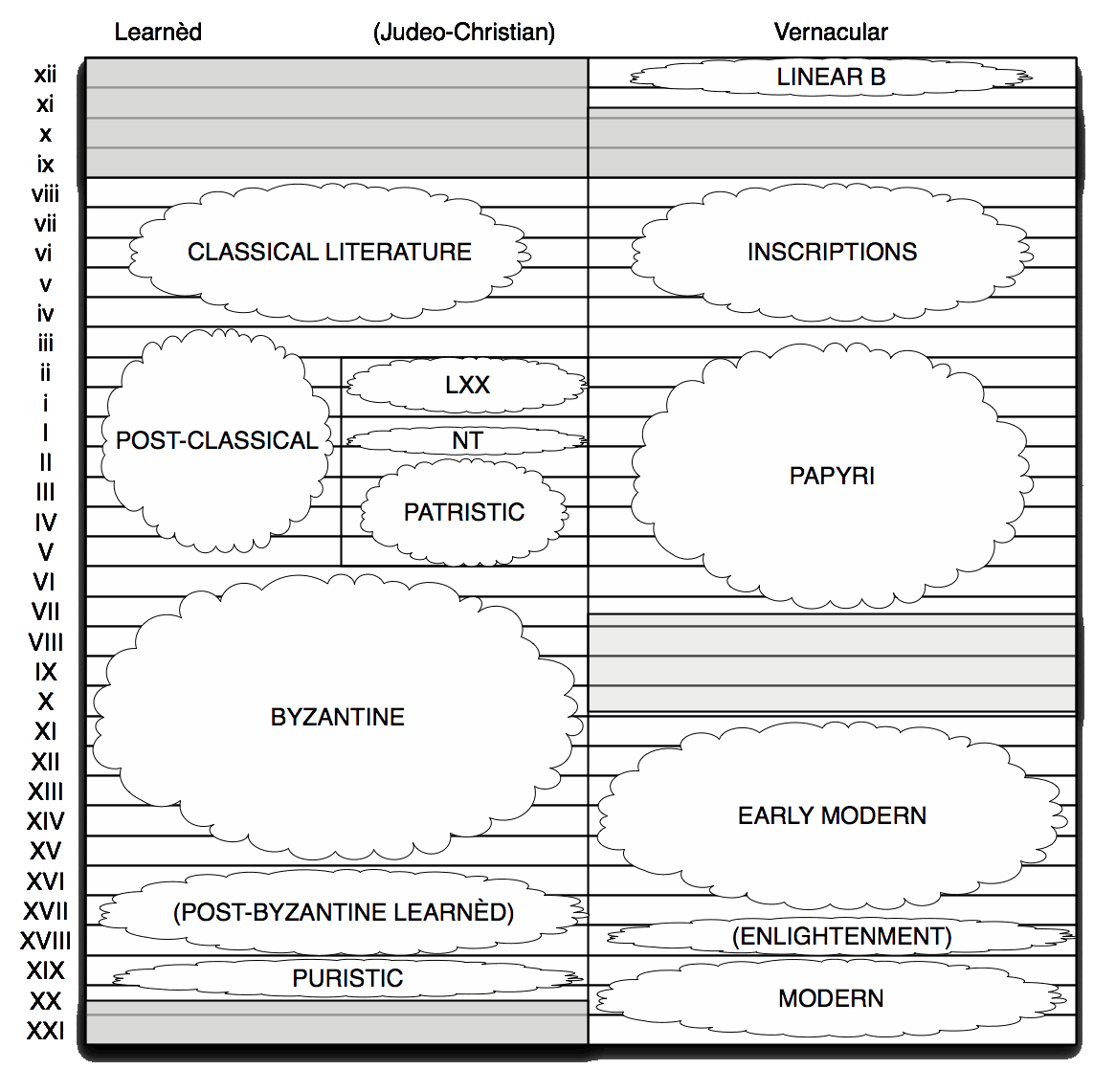
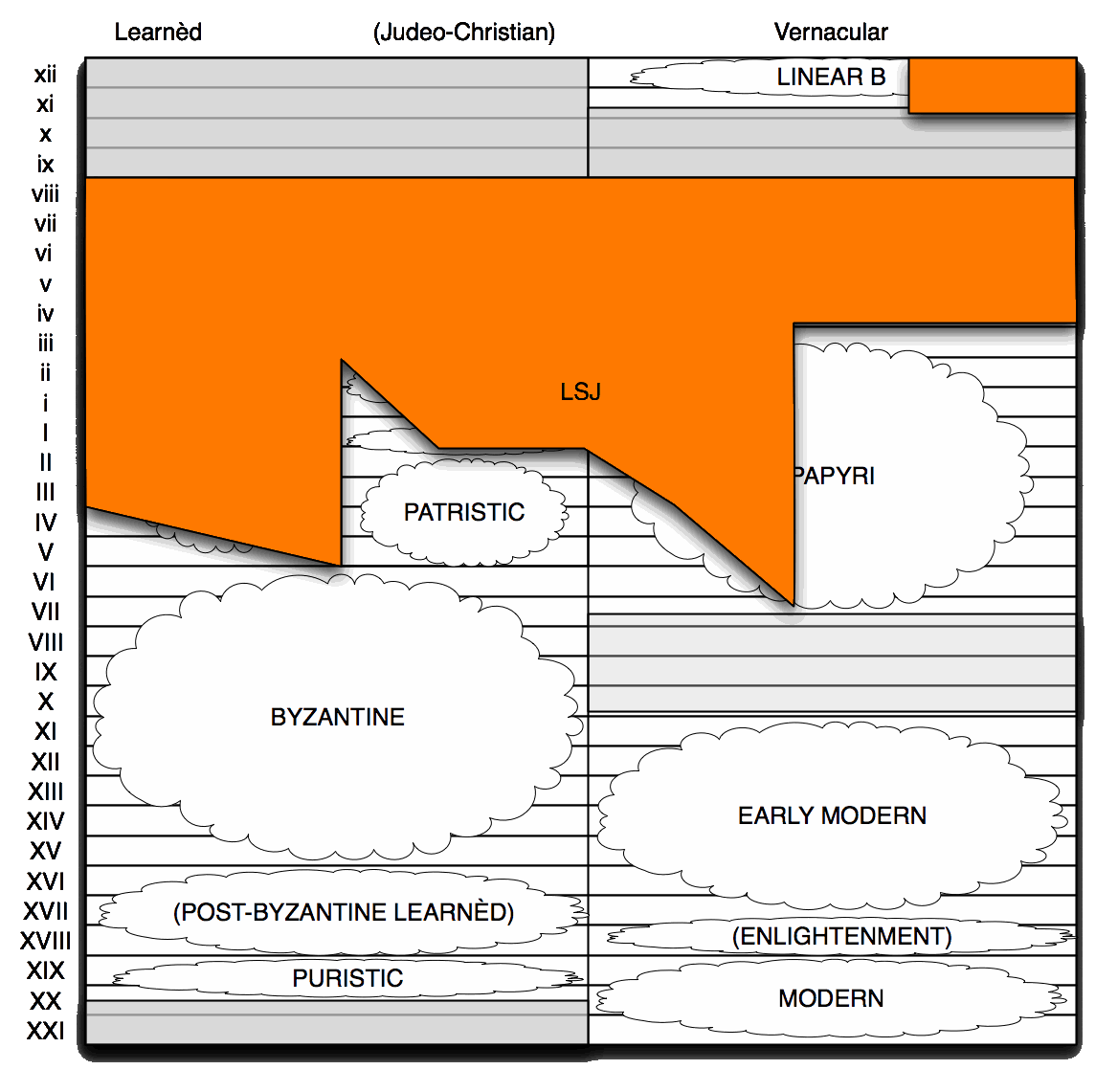
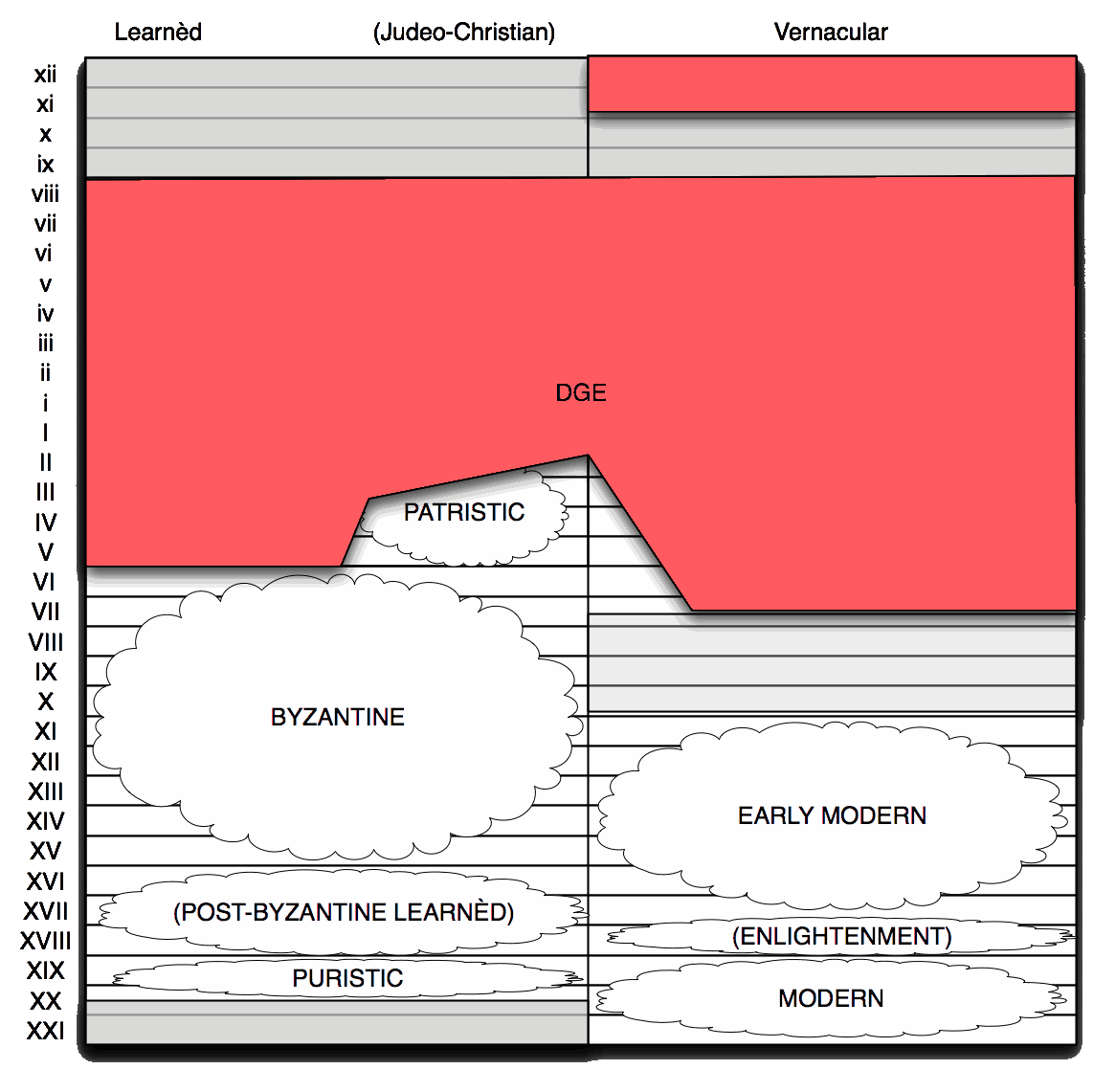
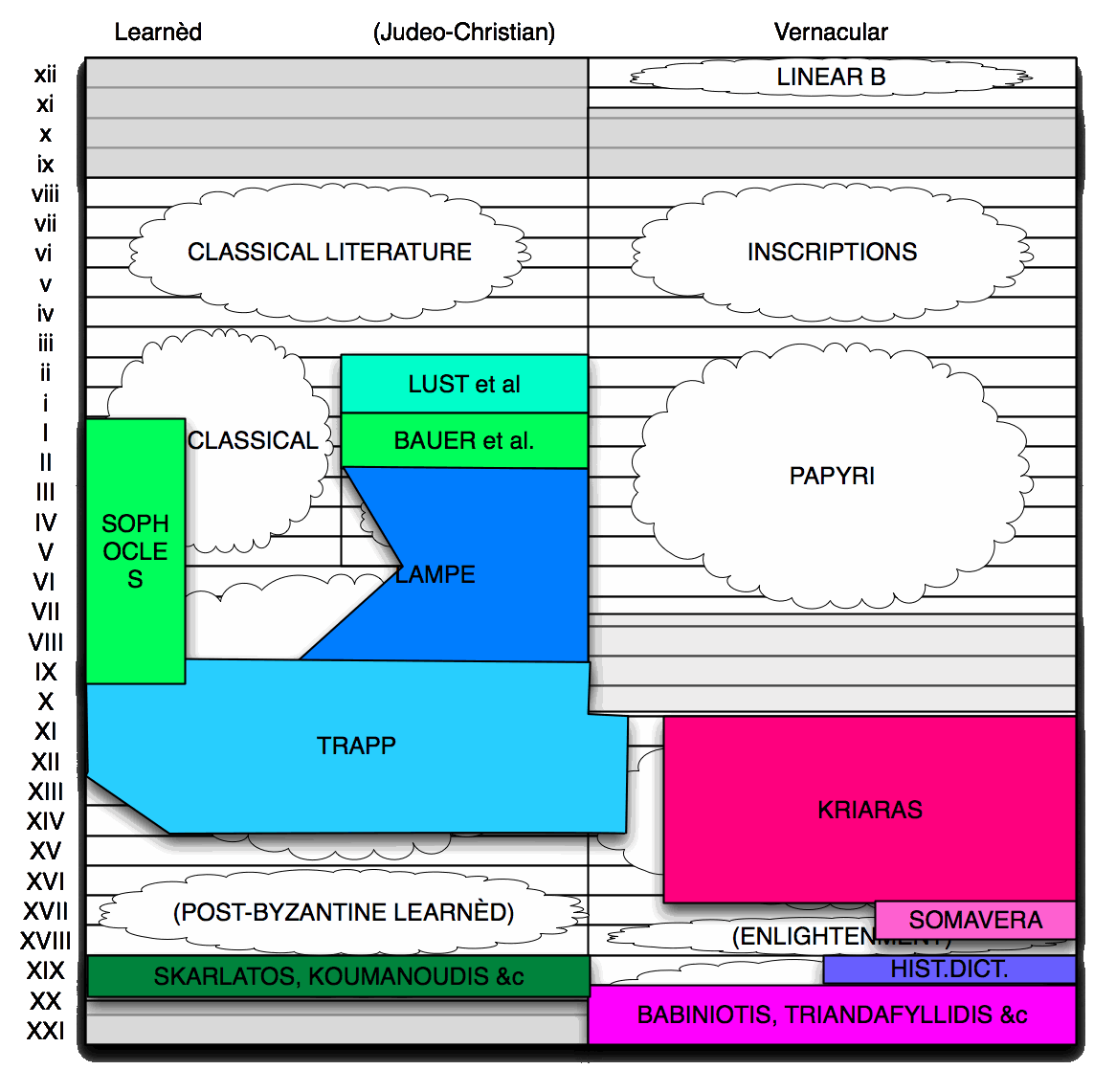
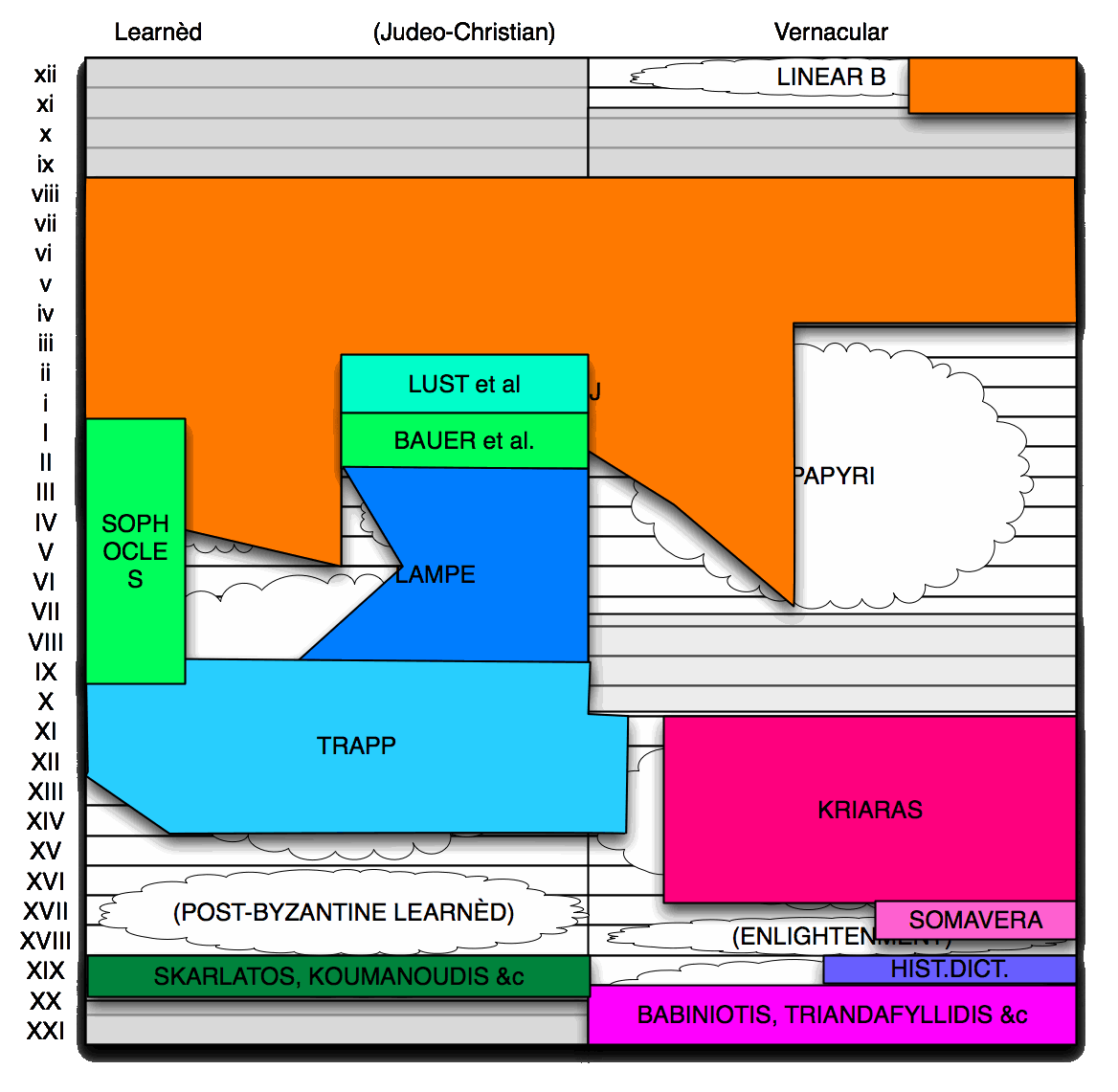

